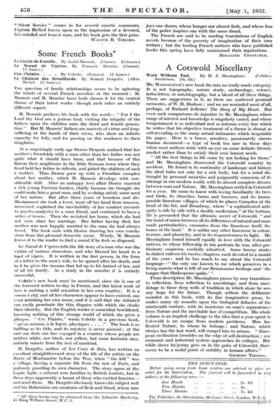Some French Books *
Ces Flutists-8. By Colette.' (Ferenezi. 12 francs.)
Le Chiteau des Brouillards. By Roland Dorgeles. (Albin Michel. 15 francs.) 'rue question of family relationships seems to be agitating the minds of several French. novelists at the moment : M. Maurois and M. Maurice have both chosen it for the central theme of their latest works—though each takes an entirely
different aspect. - M. Maurois prefaces his book with the words : " For I the Lord thy God am a jealous God, visiting the iniquity of the fathers upon the children unto the third and fourth genera- tion." But M. Maurois' fathers are marvels of virtue and long- suffering at the hands of their wives, who show an infinite capacity for folly, and for passing on this weakness to their daughters.
AL a surprisingly early age Denise Herpain realized that her Mother's friendship with a man other than her father was not quite what it should have been, and that because of this liaison their neighbours in the little Norman town where they lived held her father in ridicule, and pitied the children of such a mother. Thus Denise grew up with a Freudian complex about her mother, which M. Maurois develops with con- siderable skill. After an unhappy love affair Denise married it rich young Parisian banker, chiefly because she thought she could make him a great man, and by so doing satisfy some need of her nature. But after three years of boredom and dis- illusionment she took is lover, went off her head from remorse, recovered, explained the inevitability of her conduct (accord- to psycho-analysis) to a man friend, and continued to have a series of lovers. Then she revisited her home, which she had nut seen since her marriage. Her father having died, her mother was now happily married to the man she bad always loved. The book ends with Denise drawing her own conclu- sions from this pleasant domestic scene. Wisely, M. Maurois leaves it to the reader to find a moral if he feels so disposed.
Le Noeud de V ipercs tells the life story of a man who was the victim of various obsessions, and who likened his heart to a knot of vipers. It is written in the first person, in the form of a letter to the man's wife, to be opened after Isis death, and in it he gives the reasons that led up to his hatred of her, and of all his family. As a study in the macabre it is entirely successful.'
Colette's new book must be mentioned, since she is one of the foremost writers to-day in France, and this latest work of hers is making a mild sensation in her own country. It is a roman h clef, and all her characters appear to have existed, one even retaining her own name, and it is said that the initiated can easily penetrate the thin disguise with which she cloaks their identity. But the English reader is somewhat bewildered, k ing nothing of this strange world of which she gives a glimpse. " Ces Plaisirs," wrote Colette in a previous book, " qu'on nomme, it la legere, physiques " The book is as baffling as its title, and its mystery is never pierced ; at the end one feels one has voyaged in a country whose people are neither white, nor black, nor yellow, but some fantastic nice, entirely remote front the rest of mankind.
M. Dorgeles, author of Les Croix de Bola, has written an excellent straightforward story of the life of the artists on the Butte of Montmartre before the War, when " the hill " was a village, having a separate life from the rest of Paris, and jealously guarding its own character. The story opens at the Lapin Agile, a cabaret now familiar to British tourists, but in those days apparently a haunt of those who carried firearms— and used them. Mr. Dorgeles Obviously knows his subject well and his Bohemians are creatures of flesh and blood, whose rare * All these books may be obtained from the Librairie Hachette, 47 King William Street, W.C. 2.
joys one shares, whose hunger one almost feels, and whose fear of the. police inspires one with the same dread.
The French are said to be reading translations of English novels because of the poverty of imagination of their Veen *titers ; but the leading French authors who have published books this spring have iblly maintained their reputations.
ROSALIND CONSTABLE.






































 Previous page
Previous page